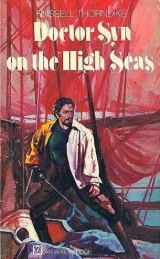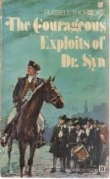
Текст книги "Doctor Syn on the High Seas"
Автор книги: Russell Thorndike
Жанр:
Исторические приключения
сообщить о нарушении
Текущая страница: 9 (всего у книги 14 страниц)
courtesy. Indeed, this official conducted them to the very end of the
wall, ordering the loiterers back to a respectful distance, so that the
gentlemen, his friends, might not be incommoded. He then bustled off
upon his business.
“There is space enough here for a fight,” said Esnada.
Doctor Syn said nothing, but loosened his sword in the scabbard.
Amidst the bawling and the singing of the seamen, they heard the orders
given for the furling of the sails, as slowly the ship drew nearer to
the entrance.
“Will he land hereabouts?” asked Syn.
“Aye,” returned Esnada. “The Harbour -master said by those steps there.
I could wish he had not driven away the crowd, for then you could have
ambushed
– 68 -
amongst them. From the height of his desk, he could spot a mouse upon
this quay, and you are so plaguy tall, my friend. Besides, the
blackness of your dress against this dazzling whiteness makes you the
more conspicuous.”
“Oh, I want him to see me,” said Syn, with a sardonic smile.
“But he’ll sulk then in his cabin, and sent others ashore about his
business,” argued Esnada.
“If so, and should my patience pass all bearing,” returned Syn, “we
could find some means of boarding her. No cabin door would keep me out,
did I once allow myself to say, ‘Now is the time’.”
Suddenly Esnada heard him draw his breath through his set teeth so
sharply that it whistled. Then, without opening his mouth, he spoke
through his throat:
“He is there upon the poop. Blue coat, gilt buttons and the white
feather in his hat. So he flaunts the badge of his cowardice, it seems.
He will do his best to avoid a fight, for there has never been a gamecock yet with a white feather. You see him?”
Esnada nodded: “He is learning against the bulwark.”
Instinctively the Spaniard loosened his scabbard, but Syn checked the
movement sharply:
“Remember this is my quarrel. You could command anything from me, but
not a drop of his blood.” He drew a brass spyglass from his pocket and
brought his enemy the nearer. “This Tappittino, or whatever he calls
himself, is a true Tappitt of Iffley, for the rascally fool is as drunk
as an owl. If his eyes are not too bleared to see me, I fancy the sight
of me will sober him.”
“Do you see a woman standing in the bows?” asked Esnada.
Round swung the spyglass to the bows. For a few tense seconds Syn
said nothing. Then he whispered, “It is she. My wife.”
Esnada wondered whether his emotion was about to get the better of
his friend, for the hands that held the glass began to shake. With the
same fear that he might lose his grim determination, Syn snapped the
glass into its sockets and thrust it in his coat. Then he said sadly:
“She is far too beautiful to have been spoiled by a devil. I never
thought she would be there amongst so many men. Well, perhaps ‘tis
better I should confront them both.”
At that instant, Imogene saw him and with a cry of terror raced for
the poop, crying aloud to Nicholas.
“He is there!” she cried. “He is waiting there to kill us! Don’t you
see? The figure in black. The figure in black. It is my husband-Christopher. I tell you it is Doctor Syn.”
Frightened by the vehemence of her terror, Nicholas jerked himself
into soberness. A cold panic drove the drink right out of him, as beads
of perspiration burst from every pore. With clenched fists she beat
against him like a terri fied child. She drove him into instant action,
for springing at his sailing -master he cried out with an oath to “Bout
ship!”
Ignorant of what dreadful catastrophe was about to fall upon them,
their panic impelled the crew into a quick and blind obedien ce. The
sharp and ringing orders were promptly answered, and the ship,
dangerously swinging round in a water-space that was hardly adequate,
all but crashed into the masonry of the quay. As it was, the helmsman’s
skillful steering did not avoid the staggering scraping from the wall.
“What re they doing? Good God! are they mad?” cried out the Harbourmaster, and his question was echoed from the crowd.
– 69 -
That there was method in their madness became at once apparent, and
with sails already unfurled again she was standing far away to sea.
The Harbourmaster came puffing up to the end of the jetty and,
making a funnel with his hands, bawled out, “Santa Maria, what is
wrong?”
But since no one on board the Santa Maria called back, Doctor Syn
vouchsafed a suggestion:
“It almost seems as though they had seen some dreadful phantom who
frightened them away.”
“I never saw a ship do that before,” replied the Harbourmaster.
“Right to the mouth of Port, her cargoes eagerly waited for, then of a
sudden, round, at great risk to the ship and all upon her, and off to
sea. Look, she is sailing resolutely, as though all Hell were after
her. I think, good Senor, you are in the right of it and this is devil’s
business.”
As he hurried away to write down in his harbour log of the
extraordinary occurrence, Doctor Syn turned to Esnada and smiled. But
the smile was very grim.
“I am glad there was no kill today, for I think this is the method of
torture to employ. He was obviously afraid. The poor, fly fox! Well, I
have covered his cover at Iffley, and I’ve covered his cover here. He
will not dare to go on breaking harbourage like this. He must put into
some port, and from that port he must sail. We must get a system of
spying on him, my good Esnada, and make it so perfect that should we
miss him at one port, we must find whither he has sailed, and post by
road or faster vessel to arrive there first.”
With the help of the Harbourmaster, Esnada was enabled to get in
touch with agents in the differe nt ports of the Peninsula, so that in a
little the movements of the Santa Maria were known to Syn before she
made them. No sooner was her destination known, but the Doctor would
set off to await his
arrival. But Nicholas was cautious. He was also very m uch afraid. The
certainty of seeing that mysterious elegant figure in black for ever
standing before him upon the end of every harbourage he sought got on
his nerves. As he could not run away each time, as he had done at San
Sebastian, he would never anchor save in mid-water. He set a guard to
watch his enemy continually, with the strictest-orders that on no
account was he to be allowed to board ship.
Nicholas himself could never go ashore, for even in the dead of
night, although the figure of Syn might disappear for an hour or so, he
knew that it would reappear again without a warning. And, as Syn
guessed, Imogene was just as frightened as Nicholas, and their horror
communicated itself to the crew, who, whenever they landed either on
pleasure bent or for business connected with the ship, avoided contact
with the figure, never lingering in case it might address them. There
mere fact that it never seemed to notice them filled these fellows with
superstitious dread, and the hardest dogs amongst them would cross
themselves devoutly as they hurried by.
And this went on and on, until the Santa Maria disappeared. She was
due to arrive at her port of lading, and, as usual, Syn was there. But
this time he waited in vain. He then traveled back the longest road
through Spain right from Cadiz, the port in question, to rejoin Esnada
in the north. There, month after month went by, and to all inquiries the
various agents’ answer was: “No news of the Santa Maria.” After a year
the agents answered finally, “She is posted amongst the Lost” But this
Syn resolutely refused to believe. He told Esnada that is was only a
question of waiting, and that sooner or later he would surely hit upon
some clue as to the whereabouts of his enemy.
– 70 -
In the meantime, Syn set himself to study languages. He added
Portuguese to his Spanish, and polished up his French.
“And I shall add to these as time allows,” he said, “for wherever the
rascal may have hidden, when I shall reappear to him it will be useful
if I can speak the language.”
Esnada and his daughter humoured him, but they were glad of the way
things had fallen, for they were fond of the Doctor, and had missed him
badly when he had been traveling from port to port. And then at last
news came.
It was the Ha rbourmaster who brought it in the shape of a sailor. A
native of San Sebastian, he had just returned home from the Americas.
He had been a member of the Santa Maria’s crew for a long time, but had
left her in Charleston when she was put up for sale. Th e owners had
bought a shallower craft to trade up -river.
Oh yes, indeed, the owner’s wife was with him. She had a child, too-a boy—and by this time doubtless had another. The husband, Black Nick,
was for ever dragging her around with him,
baby or no. The sailor went on to speak of Black Nick’s bad habits:
drinking and the worst brutality. When Syn gave him three guineas for
his story, he was back again next day, with details he had not thought
on.
Esnada warned the Doctor not to pay more heed or money, for he
thought the rascal had realized that they had no god regard for his
Black Nick, and so, by further blackening his character, he thought to
purse more guineas.
“Besides,” he added, “tis months and months since he set eyes on your
enemy, who may be anywhere by now.”
This did little good in swerving Doctor Syn. He was determined to
follow his destiny, and that was clearly pointing to America.
“It is so vast a continent,” objected Esnada.
“All the more room to follow him about in,” laughed Syn. “And ‘tis
something to know what continent he is in.”
A few days later, writing to Tony Cobtree on the subject, he ended
with:
“And so I go to America. It is the only thing I can do. Perhaps I
am called to convert the Red Indians —who knows? Or perhaps they will
convert me. Well, I know whose scalp I hunt. Life in England, despite
your father’s entreaties couched with yours and your dear wife’s, I
fear, would be to me unbearable at present. It may be long before I see
you, but I cannot think that I have walked by last on Dymchurch Wall.”
A month later, having taken a sorrowful farewell of his Spanish
friends, he crossed into Portugal and sailed from Lisbon on the
Intention, a cargo vessel bound for the port of Boston in Massachusetts.
Chapter 11
Pirates
The Intention was not a fast-sailing ship, but Syn was in no haste.
It pleased him to think that his following would be slow but relentless.
Yes, dead slow if needs be, but always deathly sure. It was this that
counteracted his boredom of that ship for the company was not congenial
to a man of his parts. The Captain, a New Englander, was the poorest
sort of man, maudlin in his cups, and miserable out of them. Religious,
too, according to his lights, which taught him that when anything went
wrong and usually by his own incompetence, all he had to say was, “It is
the Lord’s Will,” and the blame was shifted to the Diety. Certainly his
gloom of manner did not cheer the
– 71 -
spirits of those beneath his charge.
Officer and men were a mixed set, for, since his original American
crew had deserted rather than make the return trip upon such a ship,
which they condemned as unseaworthy, and the Captain to perdition, the
very sweepings of the slums had been pressed into servic e. Mostly
Portuguese, they quarreled incessantly amongst themselves, and showed no
respect for their officers. Besides Syn, the other passengers, six in
all, were disappointed merchants from Lisbon, who were going out to
found a colony. At least, that was what they boasted. But they argued
so much about this and that connected with it, and so persistently
quarreled for the post of being the first Governor, that Syn advised
them top conquer themselves before attempting to conquer a territory.
What would have happened had they ever founded that colony will never be
known. The obvious conclusion is that their scalps would speedily have
adorned the belts of war -like Redskins. Instead their fate was just as
terrible, for they were destined to walk the plank.
It was in mid ocean that they fell in with the pirates, and early one
morning under a bright sun shining upon a tranquil sea. The Portuguese
passengers had been grumbling at the slowness of the vessel, but the
Captain argued that the best navigator could not make peace without the
wind. It was then that the topsails of another vessel appeared over the
horizon, and Syn, having watched her for some time, remarked dryly that
there seemed to be plenty of breeze yonder. The ship was indeed fast
overhaul ing the Intention, and heading, too, in their direction. After
the weary weeks on a slow ship, and an empty ocean, this sight of
another vessel cheered the company. But even then, speculations as to
what she might be became cantankerous. One thought her Spanish, another
Dutch, and so on. Doctor Syn settled this argument by the help of his
powerful spy -glass.
“They fly the English flag,” he said.
“I hoped she was Portuguese,” said one of the passengers.
“There are worse colours than the English,” snapped the Captain.
The vessel came on a spanking pace, throwing white water briskly from
her bows.
“They know how to handle her,” said Syn.
Quick to take offense where none was meant, the irritable Captain
cried, “How can I handle the Intention? I told the owners she was
overdue for careening, but they would not spare me the time. Do you
hear a creaking?
“Aye,” replied Syn. “It is the mainmast. She is sprung.”
“I told you that,” retorted the Captain. “But I think otherwise. It
is the barnacles that are so clustered on her kneel that they scrape the
floor of the Atlantic.”
Syn laughed good-humourly and said, “No doubt we shall reach our port
in time, for the barnacles can carry us.”
Meanwhile the other vessel, which was the more plainly seen by all on
board with every tack, showed heavy guns from all her hatch traps.
Asked what she was, the Captain told the Portuguese that she might be
one of England’s finest fighting ships, and no doubt was carrying some
important personable to the Colonies.
“Hardly that, I think,” replied Syn. “She is well handled, true, but
not in the manner of the Royal Navy. Her officers alone would tell me
that. The men, too, are as rascally as ever I saw on shipboard.”
“But they employ the roughest dogs in the English Navy,”
sneered a Portuguese.
“But, sir,” retorted Syn, “there are indeed worse flags to be
met at sea, as the Captain said, than the English colours, and,
by gad,
– 72 -
they’re going to run up the blackest.”
To the horror of the Portuguese, the English flag, which for all
their sneering had lent to them a feeling of security, was being struck,
and in its stead up went the dreaded Jolly Roger.
“The Skull and Cross Bones!” cried the Captain.
“Pirates!” cried the passengers.
“Pirates! re-echoed the crew, with equal fear.
“It seems, gentlemen,” remarked Doctor Syn calmly, “that we are faced
with a fight, and by the look of it, our adversaries appear to have
advantages.” He turned to the Captain briskly, and said, “I’m su re I
speak for the rest of the passengers. We are under your orders, sir,
and will fight as you direct. Thank God we have no women or children
aboard.”
But his gallant bearing had no effect upon his companions, who were
terrified. Indeed, it was the Captain himself who ran to the cord and
hauled down the colours.
“We can only treat with them so, and plead for our lives,” he
whispered.
“Faith, sir,” cried Syn, “I hardly think they’ll consider some of
them worth the sparing.”
“They will be short of hands,” said the Captain, trying to raise his
own spirit. “For my part I shall not be the last to turn pirate. We
only live once.”
“I thought you were religious,” said Syn, “and I hoped to hear you
say, ‘It is the Lord’s Will’. Also I fear your hopes of being recruited
are in vain. They do not seem so short of hands.”
Indeed, as the black flag had been run up with a cheer, the roughest
villains swarmed from hiding all over the decks. A shot was fired,
which struck with perfect marksmanship, bringing the sprung mast with a
hideous crash upon the deck, killing outright a member of the crew.
Then, on that quiet morning sea, a pandemonium arose. Boats were
lowered, and in a few minutes the deck of the Intention was alive with
the rascals. They w ere led by a gigantic Negro, gaudily dressed, who
cried out that his name was Black Satan and that he was Captain of the
good ship Pit of Sulphur. This was true, for Syn, who stood apart from
his cringing companions upon the poop-deck, had read this ridicu lous
name inscribed around the pirate prow.
“Come down and do homage, you lost souls,” cried Black Satan from the
well-deck.
Led by the craven New Englander, the Portuguese obeyed promptly, and
knelt before the great Negro abjectly, while he kept whi stling a naked
cutlass over their heads, and prodding their flesh with its point.
“I am the Captain of this ship,” faltered the New Englander. “I am
the best seaman and can navigate. I will join the Brotherhood.”
Captain Satan (for he was indeed the Captain, and notorious too as
the only Negro who had commanded whites on the high seas) now spat in
his prisoner’s face.
“You navigate?” he roared. “I never saw such handling of a ship. Take
him below, my bullies, and see that he shows you the ship’s treasures.
And you other, run out the black plank. The funeral plank, my lumbers.
We provide it for you as your undertakers. Empty their pockets, then
let ‘em walk. Tie up their eyes with their own kerchiefs.”
Then, among the lively cheers of the pirates, a gangway was opened,
and a black plank which they had brought for the purpose was run out
over the water.
“Spare us,” cried the wretches. “In the name of the saints.”
– 73 -
“Talk not of saints to Satan,” cried the Negro. “Along the bridge, you
dogs, and down. The bridge that leads to hell.”
Blindfolded and pricked with cutlasses, they were hustled one by one
along that quaking, springy bridge. Steered by cold steel on either
side, most of them reached the end, stepped into air and fell into the
sea.
“Swim to the other ship,” cried the Negro, shooting down any who
clung to the hull of the Intention.
Those who could swim attempted this, but when half-across both ships
used them as targets for not only pistols, but cannon. By this time the
craven Captain was brought back from below, behind a procession of
robbers heavily laden with seachests, bales, barrels and casks, which
were quickly lowered to the boats and carried to the pirate ship. Now,
it so happened that amongst those chests were Doctor Syn’s, and he
watched it being lowered as he leaned over the bulwarks of the poop.
“Careful with you, you dogs,” he cried in Spanish. “It is of the
utmost value to me, I assure you. So see to it that I find it safe when
I come over with your Captain.”
Thinking that he must be a grandee who had saved his life by offering
sufficient ransom to Black Satan, the Spaniards in the boat called back,
“Si, Senor.”
Now, so engrossed were the others at their hellish work that no one
noted Doctor Syn, or, if they did, perhaps they did not relish closer
quarters with his long steel. By this time the whimpering captain of
the illfated Intention was dragged towards the plank.
“But I can navigate,” he pleaded.
“Then navigate yourself along that plank,” snarled the Negro.
“I will do anything to please you. I will be your slave in all
things only spare my life.”
Prodded without mercy to the end, he turned and made a last appeal.
As he stood there abjectly pleading to a nigger, Doct or Syn’s gorge
rose and when a facetious pirate shook the plank and the victim fell on
hands and legs astride the plank like a child on a rocking-horse, he
drew one of his pistols from his sash and wondered how long he should
allow a white man to demean himself before a nigger. A captain of a
ship should face death bravely. this was too undignified, and Syn vowed
it should not last.
The captain had not been blindfolded, and tears of self-pity and
terror rained down his cheeks. Syn took careful aim and fired. The
body crumpled and slipped from the plank into the sea.
“And who the devil are you to put him out of his misery without my
word of command?” demanded the astonished Satan, seeing Syn for the
first time.
“Come down here, you dog.”
“Bett er not call me a dog,” replied Syn, with a smile. “I once had a
dog that killed black beetles. As to putting that man out of his
misery, I intended no such thing. I shot him because I hate a coward,
and especially a white coward who can cringe to a nigger, and more than
all a cowardly captain who betrays his ship in the hopes of saving
himself. You are a captain, too, you say, though I can hardly think
that some of these white men fighting for you would not make a change.
The question is, Mr. Satan, if t hat’s your name, are you a cowardly
captain? That I intend to prove.”
With a bellow of rage Black Satan leaped for the poop companion
stairs, swinging his cutlass. What was his astonishment, however, when
he found a calm and elegant gentleman waiting for him with a thin blade,
which somehow all his lashings could not pass.
– 74 -
“Get down upon that deck, for I have a mind to drive you out upon
your plank. You won’t? Oh yes, you will. Down with you, nigger.”








